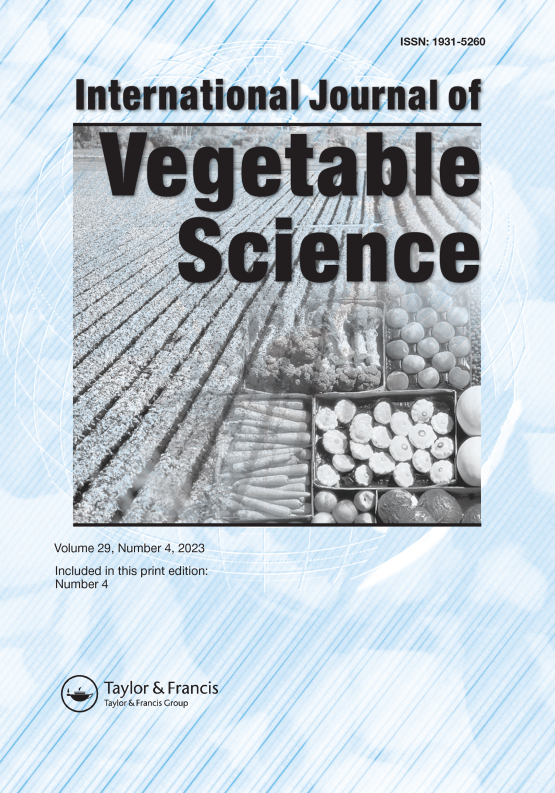Submit a Manuscript to the Journal
International Journal of Vegetable Science
For an Article Collection on
Microbial Stimulants for Sustainable Vegetable Production
Manuscript deadline

Article collection guest advisor(s)
Ajay Kumar,
Amity University, Noida, Uttar Pradesh, India
akumar59@amity.edu
Hayriye Yildiz Dasgan,
University of Cukurova, Faculty of Agriculture, Department of Horticulture
dasgan@cu.edu.tr
Microbial Stimulants for Sustainable Vegetable Production
The use of microbial stimulants align with global efforts to transition toward climate-smart, low-input agriculture. It supports several Sustainable Development Goals (SDGs), especially those related to zero hunger, good health, and climate action. Vegetables are high-value crops with short growing cycles and high nutrient demands, making them ideal candidates for microbial technologies. Moreover, advancements in rhizosphere microbiology, metagenomics, fermentation technology, and formulation science are driving innovation in microbial stimulants, offering novel insights for practical field applications. We strongly believe that these methods can promote policy-relevant and farmer-friendly innovations, offering solutions for the ecological intensification of vegetable production globally. We encourage interdisciplinary research spanning microbiology, soil science, plant physiology, biotechnology, and agroecology.
The intensification of vegetable production to meet the demands of a growing global population has led to increased reliance on chemical fertilizers and pesticides, often at the expense of soil health, biodiversity, and environmental integrity. In response, there is a growing interest in sustainable alternatives that enhance crop productivity with minimum ecological disturbance. In this regard, microbial stimulants, including plant growth-promoting rhizobacteria, endophytic microorganisms, mycorrhizal fungi, and microbial consortia, have emerged as promising tools to support plant health, improve nutrient use efficiency, and bolster resilience against biotic and abiotic stresses. Additionally, the microbial stimulants influence plant growth through various direct or indirect mechanisms such as nitrogen fixation, phosphate solubilization, hormone production, and induced systemic resistance. Their integration into vegetable cropping systems not only promotes sustainable agricultural practices but also secures long-term food security for the rising global population.
This Article Collection issue aims to explore recent advances, novel applications, and prospects of microbial stimulants in sustainable vegetable production.
Dr. Ajay Kumar is a Senior Assistant Professor at Amity Institute of Biotechnology, Amity University, Noida, India. He recently completed a Postdoc at the Agriculture Research Organization, Volcani Center, Israel, on "Postharvest management of fresh produce using beneficial microbes”. He earned his PhD from the Department of Botany, Banaras Hindu University, on "Plant microbe interaction." Dr. Kumar has published over 300 works, including research articles, reviews, books, and chapters, mainly in international journals. His research spans plant-microbe interactions, microbial biocontrol, postharvest management, endophytes in medicinal plants, and cyanobacteria-pesticide interactions.
Prof. Hayriye Yıldız Daşgan is a Professor at Çukurova University, Faculty of Agriculture, Department of Horticulture. Her research focuses on soilless and greenhouse vegetable production, plant nutrition, and the use of biostimulants both for mitigating abiotic stress and for reducing reliance on synthetic mineral fertilizers. She has published extensively on sustainable vegetable cultivation, with particular expertise in hydroponics, plant factories, and stress physiology. Prof. Daşgan also contributes to international research collaborations and serves as an editor and reviewer for several scientific journals.
Disclosure Statement: Ajay Kumar & Hayriye Yıldız Daşgan declare no conflict of interest regarding this work.
Benefits of publishing open access within Taylor & Francis
Global marketing and publicity, ensuring your research reaches the people you want it to.
Article Collections bring together the latest research on hot topics from influential researchers across the globe.
Rigorous peer review for every open access article.
Rapid online publication allowing you to share your work quickly.
Submission Instructions
Key subtopics include:
- Diversity and functional characterization of microbial stimulants in vegetable rhizospheres
- Mechanisms of plant–microbe interactions enhancing growth and resistance
- Formulation, delivery systems, and field performance of microbial products
- Role of microbial consortia and synergistic interactions
- Microbiome engineering and next-generation biofertilizer development
- Impact of microbial stimulants on soil health and nutrient cycling
- Case studies on microbial applications in sustainable horticulture
- Regulatory and commercialization perspectives for microbial inputs
To submit your papers to this Article Collection, please:
- Check "yes" for the question, "Are you submitting your paper for a specific special issue or article collection?"
- Select the relevant Article Collection from the drop-down menu under the question, "Special Issue or Article Collection Name."
All manuscripts submitted to this Article Collection will undergo desk assessment and peer-review as part of our standard editorial process. Guest Advisors for this collection will not be involved in peer-reviewing manuscripts unless they are an existing member of the Editorial Board. Please review the journal Aims and Scope and author submission instructions prior to submitting a manuscript.
